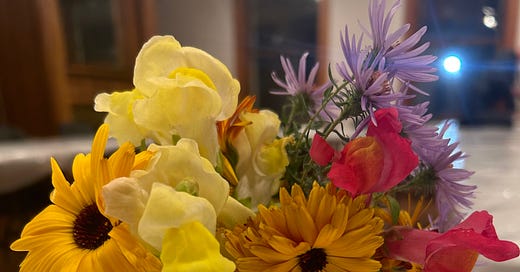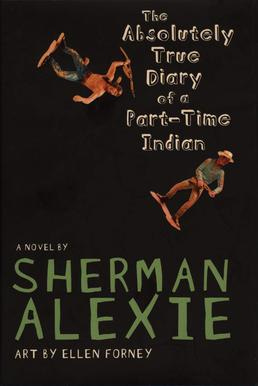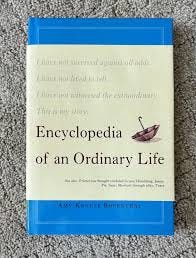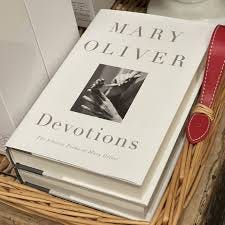Dearest Pocketful of Posies,
On election night, I participated in a Native American round dance, also known as a friendship dance. In our school cafeteria, my students, Native and non-native, their families, their friends, their teachers, and their administrators all held hands and moved to the music together. In one giant circle, we took one step after another. At points we paused, a little unsure of the next step, but we figured it out together, smiling, laughing and holding on to each other. Months ago, when I sat with my colleagues and planned this special event, I didn’t realize it would fall on election night, but on an evening filled with so much uncertainty, I think it was what many of us needed, to engage in real community.
I wasn’t sure what I would put into the world this week. I wasn’t sure I had it in me to put something into the world this week. I tend to skip my sadness, to jump into next steps, to insist on the silver lining. What happened this week brought me back to 2016, a time when I experienced a gutting personal loss that only compounded my feelings about the country’s collective loss. I was scared that if I let myself sink into my grief, I wouldn’t find my way out. I’m still scared.
In my spiral this week, I remembered something I wrote several years ago after my students finished reading Sherman Alexie’s The Absolutely True Diary of a Part-Time Indian. As I sat in my dark car with only sadness to keep me company and waited for Anna to finish her kendo class, I reread what I wrote. After I read it, I felt a little better, and so I humbly offer it to you. May we hold hands and move together even if we are unsure of the next steps.
Without further ado, today’s pocket.
My students and I just finished reading The Absolutely True Diary of a Part-Time Indian by Sherman Alexie. Junior, or Arnold Spirit, Alexie’s protagonist, is a “budding cartoonist growing up on the Spokane Indian reservation. Born with a variety of medical problems, he is picked on by everyone but his best friend. Determined to receive a good education, Junior leaves the rez to attend an all-white school in the neighboring farm town where the only other Indian is the school mascot.”
Just like many of the teenagers I work with, Junior faces immense lose. In one year, he loses his Uncle Eugene, his sister and his grandmother. One of the ways that Junior copes with the trauma in his life is by realizing that he has community.
“I realized that I might be a lonely Indian boy, but I was not alone in my loneliness. There were millions of other Americans who had left their birthplaces in search of a dream. I realized that sure, I was a Spokane Indian. I belonged to that tribe. But I also belonged to the tribe of American immigrants. And to the tribe of basketball players. And to the tribe of bookworms.
And the tribe of cartoonists.
And the tribe of chronic masturbators.
And the tribe of teenage boys.
And the tribe of small-town kids.
And the tribe of Pacific Northwesterners.
And the tribe of tortilla chips-and-salsa lovers
And the tribe of poverty
And the tribe of funeral-goers.
And the tribe of beloved sons.
And the tribe of boys who really missed their best friends.
It was a huge realization.
And that’s when I knew that I was going to be okay.”
I teach at a public high school in the city of Spokane, not too far from the reservation where Junior was born, where Alexie himself was born. I have Native and non-Native students in my class, but one thing that many of my students have in common is that they belong to the tribe that’s been to hell and back before turning 18. Too many of them belong to the tribe of alcoholic and abusive parents, the tribe of absent parents, the tribe of poverty, the tribe of addiction, the tribe of harmful relationships, the tribe of sexual assault. The list of toxic tribes is extensive. In the past two years, we have lost five students to suicide.
Storytelling is an integral part of Native culture. Thomas King writes in The Truth about Stories, A Native Narrative “the truth about stories is that’s all we are.” He refers to the stories he tells again and again as saving stories, stories that make him laugh, stories that give him hope, stories that remind him to be resilient, stories that keep him alive… I offer my students the chance to write their own saving stories, and I share Amy Krouse Rosenthal’s beautiful memoir An Encyclopedia of An Ordinary Life as one example of how to go about this. Amy’s novel is quirky and light. It begins with her saying, “I have not survived against all odds. I have not lived to tell. I have not witnessed the extraordinary. This is my story.” Her book is categorized alphabetically. Between the entries catch and car radio is car wash, which reads, “Every time I go to my local car wash, the owner peers inside, throws his arms up, and says, Oh, Miss—very dirty. Very, very dirty. I’m sorry. I didn’t know I was supposed to bring it in clean.” My favorite excerpt though is her last entry. You. “Perhaps you think I didn’t matter…that I didn’t truly, fully, with all my senses, experience life as you are presently experiencing it, or think about _____ as you do… But I was here. And I did things. I stubbed my toe…. I hugged my mother and father and hoped they would never die…I got hiccups…I loved my children…I loved mayonnaise…I chewed on a blade of grass…I was here, you see. I was.” One of the writing exercises that I love to do with my students is to have them write their own version of You, to give them a chance to share the things they have done on this planet, the things that have brought them joy and pain, the people they have loved… Amy’s writing is delicious and fun to read, but it is also a reminder that we are not alone. We belong to the tribe of humanity.
Melissa, one of my students, moved before the first semester ended. I was sad to see her go. She was interested in learning, took my book suggestions and was reading up a storm. She enjoyed the writing exercises, and she was eager to improve her writing. She wrote about moving to Spokane from California and not quite fitting in. The school where I teach is diverse for Spokane, but diverse for Spokane doesn’t always feel diverse enough for our students of color. She was workshopping one piece of writing about belonging and identity where she described a shopping trip with her aunt. In her scene, she picked out an outfit that she loved, and her aunt suggested she choose something a little more subdued, something that would allow her to blend in a little more. I told her that we would celebrate her on her last day in class with us, that I would bake something in her honor, and she told me that I shouldn’t do that because she wasn’t important.
Junior, like Amy Krouse Rosenthal, makes a few lists. He does this after an incident where his friends rally for him. He has missed a lot of school because his family is grieving the death of his sister, and when he returns his teacher sarcastically says, “Oh class…we have a special guest today… I didn’t realize you went to this school, Mr. Spirit.” In protest, Junior’s friend Gordy drops his textbook and then walks out of the classroom, followed by the other students. Junior then has an epiphany and starts laughing. Alone with his teacher, he tells her, “I used to think the world was broken down by tribes. By black and white. By Indian and white. But I know that isn’t true. The world is only broken into two tribes: the people who are assholes and the people who are not.” Junior was in a dark, dark, dark place after his sister died. It was grief all the way down, and he was buried beneath it all, but the heroism of his friends sparks something in him, and he starts making lists of things worth living for, all the things that bring him joy…friends, family, foods, basketball players...
My students and I make lists of our own on chart paper.
We list our tribes of belonging. “I belong to the tribe of Grandma lovers, the tribe of clean ears, the tribe of Flathead and CDA Indians, the tribe of sleepers, the tribe of broke teenagers, the tribe of average students, the tribe of marvel fans…”
We list our Me statements. “I stole food all summer because my family was broke and couldn’t afford food, I fell up the stairs, I ran from the cops, I wrote upside down (written upside down of course), I laughed, I cried over a broken heart…I wished to end it all.”
We list what we have learned about stories: “Storytelling is important because it can help us know where we’ve been and where we wanna go. It encourages us to go on in the face of suffering. It allows us to bond, to relate to others, to escape the depths of suffering. It gives people hope through the things they’ve gone through. Stories help us remember. Stories keep us alive.”
Whenever I’m struggling, I turn to poetry. I carry Mary Oliver’s Devotions around with me wherever I go, like a shield. In her poem, “Wild Geese,” she writes “whoever you are, no matter how lonely, the world offers itself to your imagination, calls to you like the wild geese, harsh and exciting—over and over announcing your place in the family of things” These lists that we make, these tribes that we belong to. These stories that we read and tell. They remind us of our place in the family of things. The charts my students and I created are posted in my classroom, side by side…the shared joys and despairs of being human, the many tribes of belonging and the transcendent power of stories. May they continue to tether all of us, to remind us that we are not alone and that we like Junior are going to be okay.
With so much love,
Mary








This piece feels like a hug 🤗
Mary, your students are so fortunate to have you! I'm wishing I were one of them (at age 65!). I love that you keep Devotions nearby. Over the past year or two, I've been memorizing Mary Oliver poems, both as a spiritual practice and a dementia-prevention exercise. You and I are members of the tribe that loves Mary's poetry 🤗❤